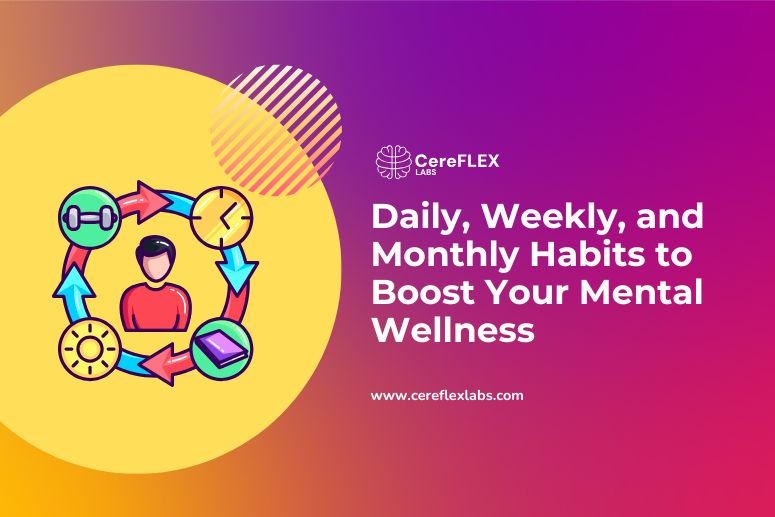A healthy mindset isn’t built in one burst of motivation. It grows through small, consistent choices you repeat every day, week, and month.
These habits form a framework for resilience. They help you manage stress, stay focused, and keep a positive outlook when life feels challenging. Breaking things into daily, weekly, and monthly routines also makes new practices easier to commit to and sustain.
Daily actions keep your mind sharp in the moment. Weekly rituals provide balance and renewal. Monthly check-ins give you perspective and room to grow.
At CereFLEX Labs, we believe brain health and mindset go hand in hand. Simple routines, paired with thoughtful nutritional support like our AM/PM Protocol, can help adults feel more consistent and supported in their wellness goals.
In this guide, we’ll share practical habits you can start using today to strengthen your mindset for the long term.
Here is the Quick Answer |
|
A strong mindset comes from consistent habits across daily, weekly, and monthly routines. Daily practices like mindfulness, exercise, healthy eating, and sleep keep your mind steady in the moment. Weekly rituals such as social connection, self-care, and hobbies help you recharge and prevent stress buildup. Monthly check-ins through goal-setting, reflection, and learning ensure long-term direction and balance. Small, repeatable actions at each level compound over time, creating lasting mental clarity, resilience, and focus. |
Daily Habits for a Healthy Mindset
Your daily actions are the backbone of mental wellness. Small, repeatable practices create stability, helping you manage stress and stay balanced.
Daily Practices to Strengthen Your Mental Health |
|---|
|
- Practice Mindfulness or Meditation - Engage in Physical Activity - Eat Nutritious Foods - Stay Hydrated - Prioritize Sleep - Gratitude Practice - Appreciate the Small Things - Manage Stress Proactively - Cultivate Meaningful Relationships - Set Boundaries - Self-Reflection - Take Medications Consistently |
Practice Mindfulness or Meditation
Start each morning with a few minutes of intentional stillness. Whether it’s guided meditation, deep breathing, or simply noticing your surroundings, mindfulness helps you stay present. Over time, it reduces stress and strengthens emotional regulation.
Engage in Physical Activity
Exercise isn’t just about fitness. It’s a mental health booster. Movement releases endorphins, improves sleep, and lifts energy. Even a 20–30 minute walk outside can clear brain fog and brighten your mood.
Eat Nutritious Foods
What you eat influences both mood and focus. A diet rich in whole foods (vegetables, fruits, whole grains, lean protein, and healthy fats) provides steady energy for your brain. Limiting processed foods and excess sugar helps prevent energy crashes.
Stay Hydrated

The brain relies on hydration to function properly. Even mild dehydration can trigger fatigue, irritability, and poor focus. Keep water nearby and sip throughout the day to support clarity and memory.
Prioritize Sleep
Sleep is when the brain consolidates information and restores balance. Poor rest can lead to brain fog and low mood. Set consistent sleep and wake times, avoid screens before bed, and create a cool, dark sleep environment.
Gratitude Practice
Write down or reflect on three things you’re grateful for each day. This trains your brain to notice the positive and reduces the pull of negative thoughts.
Appreciate Small Moments
Pause to notice everyday joys — sunlight through the window, a hot cup of tea, or a laugh with someone you love. These brief moments can boost mood and give your day a sense of richness.
Manage Stress Proactively
Don’t wait for stress to build. Incorporate short resets like stretching, breathing breaks, or a quick walk. These small pauses help prevent overwhelm.
Stay Connected

Daily connections, such as a call, a message, or a short chat, remind you that you’re supported. Relationships form a key buffer against stress.
Set Healthy Boundaries
Protect your time and energy. Saying no to draining commitments or switching off from work after hours helps you stay in control and reduces unnecessary stress.
Reflect Daily
Take a few minutes in the evening to check in with yourself. Journaling or simple reflection helps you spot patterns and adjust before small issues become bigger.
Take Medications Consistently
If prescribed medication is part of your care plan, consistency is essential. Taking them at the same time each day helps them work as intended and keeps your mind steady.
Weekly Habits for a Healthy Mindset
Weekly practices give you a chance to recharge, reflect, and reconnect. These rituals prevent burnout and keep life balanced.
Weekly Practices for a Healthy Mindset |
|---|
|
- Connect Deeply with Others - Limit Screen Time - Engage in Enjoyable Activities - Practice Self-Care - Give to Charity or Volunteer - Check Work-Life Balance |
Connect Deeply with Others
Plan intentional interactions each week, such as a dinner, coffee date, or video chat. Strong social bonds reduce stress and create a sense of belonging.
Limit Screen Time
Choose at least one evening to unplug from devices. Read, cook, or spend time outside. Breaks from screens restore focus and support better sleep.
Engage in Enjoyable Activities
Set aside time each week for hobbies like painting, gardening, music, or sports. These activities bring joy, stimulate creativity, and release stress.
Practice Self-Care
Dedicate time for care that truly restores you. This might mean a yoga class, journaling, or a long bath. The goal is to recharge, not just distract.
Volunteer or Give Back

Spending time helping others provides perspective and purpose. Volunteering weekly or supporting a cause can boost happiness and reduce stress.
Check Work-Life Balance
Set aside a moment weekly to reflect on your balance between work, rest, and personal time. Adjust as needed to avoid burnout and protect your well-being.
Monthly Habits for a Healthy Mindset
Monthly rituals help you zoom out and gain perspective. They’re about adjusting your course, strengthening long-term resilience, and making sure your habits align with your bigger goals.
Monthly Rituals for Mental Wellness |
|---|
|
- Set Monthly Goals - Review Your Progress - Expand Your Knowledge - Gratitude Ritual - Seek Professional Support if Needed - Start or Explore a New Hobby - Review Financial Goal - Adapt with Ease - Reflect and Reset |
Set Monthly Goals
At the start of each month, define realistic personal, professional, or wellness goals. Having a fresh set of intentions keeps you motivated and focused on growth.
Review Your Progress
End the month with honest reflection. What went well? Where did you struggle? What lessons can you carry forward? These monthly check-ins keep you accountable and adaptable.
Expand Your Knowledge
Dedicate time each month to learning something new, for example a book, an online course, or a workshop. Unlike daily reading or hobbies, this is about deeper enrichment that fuels long-term mental agility.
Gratitude Ritual
Go beyond daily gratitude lists by taking stock of the entire month. Reflect on major experiences, challenges, and wins. This larger-scale gratitude helps you appreciate the bigger picture.
Seek Professional Support if Needed

Use monthly self-assessment to check in on your mental health. If you notice persistent patterns (like ongoing anxiety or lack of focus) consider reaching out to a counselor or healthcare provider before small issues grow.
Explore a New Hobby or Activity
Introducing something fresh once a month, like a new class or creative pursuit, keeps your routine dynamic. It challenges your brain in new ways and prevents life from feeling stagnant.
Review Financial Goal
Money stress often builds slowly. A monthly budget review helps reduce anxiety, ensures stability, and keeps your financial wellness aligned with your mental wellness.
Adapt with Ease
Life changes quickly. Each month, assess where you might need flexibility (whether in work, relationships, or health habits) and adjust your approach to avoid rigidity.
Reflect and Reset
Step back to see if your current path aligns with your values and long-term goals. This monthly reset helps you stay intentional rather than slipping into autopilot.
How Habits Complement Cognitive Support
Daily, weekly, and monthly habits are the foundation of long-term mindset resilience. But healthy routines also work best when your body and brain have the right nutritional support.
Think of habits as pathways: the more consistently you walk them, the stronger they become. Nutrition provides the energy and stability those pathways need to function well. When you’re well-rested, hydrated, and nourished with essential vitamins and minerals, your habits are more likely to stick and deliver meaningful benefits.
A structured supplement system can fit naturally alongside these routines. For example, pairing a mindful morning ritual with the AM Brain Morning Formula from CereFLEX Labs helps support cognition as you start your day.
In the evening, combining the PM Cognitive Support Evening Formula with a screen-free wind-down can help your body transition into rest while providing nutrients that maintain good health.
For those already using nootropic support, building the right lifestyle routines can make a big difference. See our guide on the best habits for boosting nootropic results to understand how daily choices and supplementation can work hand in hand.
By aligning smart daily, weekly, and monthly habits with a consistent AM/PM Protocol, you’re giving your brain comprehensive, around-the-clock support to help you show up at your best.
Habit Formation Tips & Sustainability
Building new habits isn’t about drastic changes. It’s about creating small, repeatable steps that blend into your daily life. A sustainable approach helps your routines last well beyond the first burst of motivation.
- Stack habits: Link a new practice to something you already do. For instance, while your morning coffee brews, take three deep breaths or jot down a gratitude note.
- Track progress visually: Use a journal, wall calendar, or habit-tracking app. Seeing your streak grow builds momentum.
- Find accountability: Share your goals with a friend, family member, or group. Regular check-ins provide encouragement and make consistency easier.
- Start small: Begin with one or two habits. Once they feel natural, add new ones gradually. This keeps change approachable and sustainable.
These strategies help make habits stick, turning small choices into lasting routines that support a healthier mindset over time.
Conclusion
A healthy mindset isn’t about doing everything perfectly. It’s about showing up consistently. Daily practices keep you grounded, weekly rituals give you balance, and monthly check-ins help you reflect and reset. Together, these layers create a structure that supports clarity, resilience, and long-term well-being.
For those who want an extra layer of support, CereFLEX Labs’ AM/PM Protocol offers a simple way to cover essential daily nutrients. Designed as a morning and evening system, it provides vitamins, minerals, and antioxidants that work alongside your lifestyle habits to help support cognition and memory.
Start small, stay consistent, and remember. Each positive step adds momentum. Over time, these choices build not just habits, but a stronger, steadier mindset for the future.






